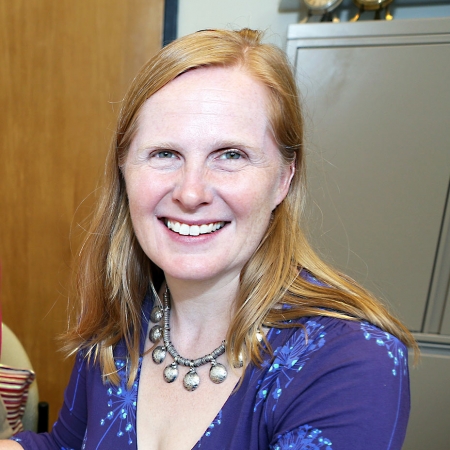Sarah Dryden-Peterson is an Associate Professor at the Harvard Graduate School of Education. She is the founder and director of REACH, which promotes research, education, and action for refugees. In addition to her university teaching, she has taught in primary and secondary schools in the United States, South Africa, and Madagascar. Her newest book Right Where We Belong: How Refugee Teachers and Students Are Changing the Future of Education is published by Harvard University Press.
Sarah will be discussing Right Where We Belong in our City Lights LIVE! virtual event series on Wednesday, April 27th, 2022! with special guests Monisha Bajaj and Esther Elonga. This event is presented in conjunction with Refugee and Immigrant Transitions and a consortium of departments at the University of San Francisco.
Where are you writing to us from?
From the oldest home still standing in Jamaica Plain in Boston, Massachusetts, built in 1716. We think our children are the 79th and 80th children to grow up in this home, and we love imagining the experiences of the children who came before them.
What has been most important for you, personally/artistically/habitually, during the pandemic?
Early mornings always feel like a special time of day for me. The smell of the air at sunrise and the sounds of birds particular to the place where I am have shaped the rhythms of my writing: the loons of Ontario, great blue herons of New Hampshire, hoopoes of Botswana, hornbills of Uganda. During the pandemic in Boston, it was the silence of early mornings that helped me feel ready for the abundance of a house full of people I love that filled the rest of my days.
Which writers, artists, and others influence your work in general, and this book, specifically?
The chapters of this book are titled: Teacher, Sanctuary, Power, Purpose, Learning, Belonging, Home. As I wrote each of these chapters, I dove into fiction that explored similar concepts. Some that stand out are Happiness by Aminatta Forna, Go, Went, Gone by Jenny Erpenbeck, Warlight by Michael Ondaatje, Salt Houses by Hala Alyan, and the poetry of Langston Hughes.
What books are you reading right now and would you recommend any to others?
I’m deep in books about creating and re-creating home and relationships of belonging to people and place. Some favorites I have read over the last months are The Old Drift by Namwali Serpell and What Strange Paradise by Omar El Akkad. Favorites I have listened to––with the extra treat of being read to by the author––are How the Word Is Passed: A Reckoning with the History of Slavery Across America by Clint Smith and Conditional Citizens: On Belonging in America by Leila Lalami.
If you opened a bookstore, where would it be located, what would it be called, and what would your bestseller be?
It would be a neighborhood bookstore in the place I live. I’d call is Pass It On, a space to share ideas through books among people who share the same geographic space of home and across generations. Encouraged would be writing in the books and placing things inside the books! Notes in the margins, questions for the next reader, a flower from the park where the reader sat to read. The practice is meant to recall the delight of opening a textbook in school and seeing the name of a person years older than you who once had that same book, and imagining a shared trajectory through learning or receiving a book and seeing a handwritten inscription, the purpose-filled gift of a story from one person to another. Intergenerational reading suggestions would be shaped around big, thorny questions, with books for adults, young adults, and children packaged together. A first question might be, “What does it take to create a welcoming community?” with this intergenerational collection: The Wrong End of the Telescope by Rabih Alameddine; American Street by Ibi Zoboi; and Where Are You From? by Yamile Saied Méndez.

